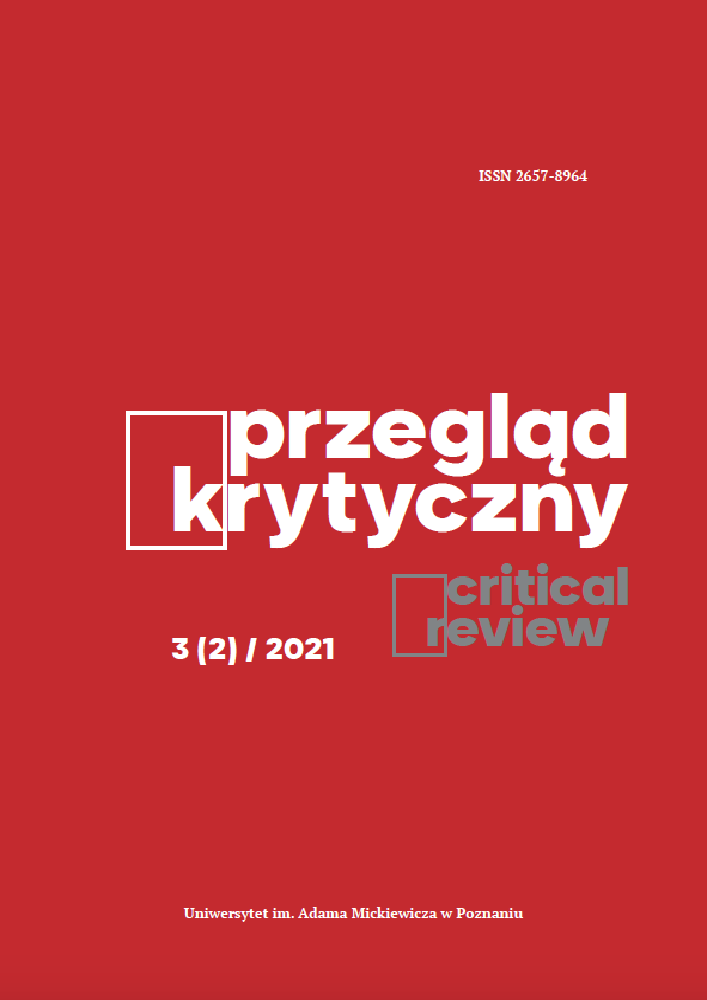Abstract
Critical Studies on Men and Masculinities offer an array of terms and categories to describe masculinities and gender relations. The hegemonic masculinity theory of R.W. Connell is the most common theory that has monopolised studies on masculinities. However, it has been criticised heavily, the result being new ways of describing masculinities, including hybrid masculinities. The main aim of the article is to provide Polish readers with comprehensive descriptions and a critique of theoretical theories on men and masculinities with special focus on the hybrid masculinity theory. The analysis provides definitions of hybrid masculinities and considers consequences of hybridisation. Besides, the author analyses studies, which use the concept of hybrid masculinities. Finally, the hybrid masculinity theory is presented and discussed in the light of other theories of masculinities.
References
Anderson, Eric. 2009. Inclusive masculinity: the changing nature of masculinities. New York: Routledge.
Arcimowicz, Krysztof. 2020. Oblicza męskości w neoserialach. Hegemonia-kontaminacja-inkluzja. Białystok: Wydawnictwo UWB.
Arcimowicz, Krzysztof. 2022. „Męskość hybrydowa i władza. Krytyczna analiza dyskursu neoserialu Dom z papieru.” Miscellanea Antropologica et Sociologica, w druku.
Arxer, Steven L. 2011.”Hybrid Masculine Power: Reconceptualizing the Relationship Between Homosociality and hegemonic Masculinity.” Humanity & Society 35: 390-422. DOI: https://doi.org/10.1177/016059761103500404
Barber, Kristen. 2008. “The Well-Coiffed Man: Class, Race and Heterosexual Masculinity in the Hair Salon.” Gender and Society 22(4): 455-476. DOI: https://doi.org/10.1177/0891243208321168
Beasley, Christine. 2008a. “Reply to Messerschmidt and to Houston.” Men and Masculinities 11(1): 114-115.
Beasley, Christine. 2008b. “Rethinking hegemonic masculinity in a globalized world.” Men and Masculinities 11(1): 86-103.
Berggren, Kalle. 2014. “Sticky Masculinity: Post-structuralism, Phenomenology and Subjectivity in Critical Studies on Men.” Men and Masculinities 173(3): 231-252. DOI: https://doi.org/10.1177/1097184X14539510
Bhabha, Homi. 1998. “The Commitment to Theory.” New Formations 5: 5-23.
Bridges, Tristan. 2010. “Men just weren’t made to do this.” Gender & Society 24(1): 5-30. DOI: https://doi.org/10.1177/0891243209356924
Bridges, Tristan i C. J. Pascoe. 2014. “Hybrid masculinities: New directions in the sociology of men and masculinities.” Sociology Compass 8(3): 246-258. DOI: https://doi.org/10.1111/soc4.12134
Bridges, Tristan i C.J. Pascoe. 2018. “On Elasticity of Gender Hegemony. Why hybrid Masculinities Fail to Undermine Gender and Sexual Inequality”. Ss. 254-274 w Gender Reckonings: New Social Theory and Research, pod red. J.W. Messerschmidt, P.Y. Martin, M.A. Messner, R.W. Connell. New York: NYU Press.
Connell, Reawen W. 1995. Masculinities. Sydney: Allen & Unwin.
Demetriou, Demetrakis Z. 2001. “Connell's concept of hegemonic masculinity: A critique.” Theory & Society 30(3): 337-361. DOI: https://doi.org/10.1023/A:1017596718715
Donaldson, Mike. 1993. “What is hegemonic masculinity.” Theory & Society 22(5): 643-657. DOI: https://doi.org/10.1007/BF00993540
Donovan, Brian. 1998. “Political consequences of private authority: Promise Keepers and the transformation of hegemonic masculinity.” Theory & Society 27(6): 817-843. DOI: https://doi.org/10.1023/A:1006909132442
Elliott, Karla. 2015. “Caring masculinities: Theorizing an emerging concept.” Men and Masculinities 12: 1–20. DOI: https://doi.org/10.1177/1097184X15576203
Elliott, Karla. 2020a. “Bringing in margin and centre: ‘Open’ and ‘closed’ as concepts for considering men and masculinities.” Gender, Place & Culture 27(12): 1723-1744. DOI: https://doi.org/10.1080/0966369X.2020.1715348
Elliott, Karla. 2020b. Young Men Navigating Contemporary Masculinities. Switzerland: Palgrave Macmillan.
Haverda, Timothy. 2019. Hybridizing masculinity: gender identity negotiation among men’s rights activists. Pobrano 10 listopada 2020 (https://www.proquest.com/openview/684f78c428f4de06616fb4dc75a19ea7/1?pq-origsite=gscholar&cbl=18750&diss=y).
Hearn, Jeff, 1996. “Is masculinity dead?: A critical account of the concept of masculinity/masculinities”. Ss. 202-217 w Understanding masculinities: Social relations and cultural arenas, pod red. M. Mac and Gaill. Milton Keynes: Open University Press.
Hearn, Jeff. 2004. “From hegemonic masculinity to the hegemony of men.” Feminist Theory 5(1): 49-72. DOI: https://doi.org/10.1177/1464700104040813
Hearn, Jeff. 2009. “Deconstructing the hegemony of men and masculinities – presentation of the research theme”. Ss. 13-26 w J. Hearn, red. GEXcel Work Progress Report Volume 5. Pobrano 15 października 2020 (http://liu.diva-portal.org/smash/get/diva2:792339/FULLTEXT01.pdf).
Howson, Richard. 2005. Challenging hegemonic masculinity. London: Routledge.
Howson, Richard. 2008. “Hegemonic masculinity in the theory of hegemony.” Men and Masculinities 11(1): 109-113. DOI: https://doi.org/10.1177/1097184X08315105
Kimmel, Michael. 1995. The Politics of Manhood: profeminist men respond to the mythopoetic men's movement (and the mythopoetic leaders answer). Philadelphia: Temple University Press.
Kimmel, Michael S. 2017. Angry White Men: American Masculinity at the End of an Era, 2nd ed. New York: Nation Books.
Kluczyńska, Urszula. 2017a. Mężczyźni w pielęgniarstwie. W stronę męskości opiekuńczej. Poznań: Wyd. UMP.
Kluczyńska, Urszula. 2017b. “Motives for choosing and resigning from nursing by men in Poland and the definition of masculinity: a qualitative study.” Journal of Advanced Nursing 73(6): 1366–1376. https://doi.org/10.1111/jan.13240
Kluczyńska, Urszula. 2018. „Socjologiczne studia nad mężczyznami i męskościami w Polsce. Obszary, perspektywy, teorie.” Wielogłos 37(3): 1-20. DOI: 10.4467/2084395XWI.18.026.10190
Kluczyńska, Urszula. 2021. „Caring masculinity or hybrid masculinity? An analysis of research results on male nurses.” Society Register 5(1): 7-26. DOI: 10.14746/sr.2021.5.1.01
Lis, Bartek. 2015. Gejowskie (nie)męskości. Normy płciowe a strategie tożsamościowe gejów. Gdańsk: Katedra.
Masters, N. Tatiana. 2010. “‘My Strength is Not for Hurting’: Men’s Anti-Rape Websites and their Construction of Masculinity and Male Sexuality.” Sexualities 13(1): 33-46. DOI: https://doi.org/10.11.77/1363460709346115
Messner, Michael. 1993. “Changing men’ and feminist Politics in the United States.” Theory & Society” 22(5): 723-737.
Messner, Michael. 2007. “The Masculine of the Governator.” Gender and Society 21(4): 461-480. DOI: https://doi.org/10.1177/0891243207303166
Sarvan, David. 1998. Talking Like A Man: White Masculinity, Machismo, and Contemporary American Culture. Princeton, NJ: Princeton University Press.
Waling, Andrea. 2018. “Rethinking Masculinity Studies: Feminism, Masculinity, and Poststructural Accounts of Agency and Emotional Reflexivity.” Journal of Men’s Studies 27(1): 89-107. DOI: https://doi.org/10.1177/1060826518782980
Ward, Jane. 2015. Not gay. Sex between straight white men. Nowy Jork: NYU Press.
Wetherell, Margaret i Nigel Edley. 1999. “Negotationg hegemonic masculinity: Imaginary positions and psycho-discursive practices.” Feminism & Psychology 9(3): 335-356. DOI: https://doi.org/10.1177/0959353599009003012
Whitehead, Stephen. 1999. “Hegemonic masculinity revised.” Gender, Work and Organization 6(1): 58-62. DOI: https://doi.org/10.1111/1468-0432.00069
Whitehead, Stephen M. 2002. Men and Masculinities. Oxford: Polity Press.
Wojnicka, Katarzyna. 2021. “Men and masculinities in times of crisis: between care and protection.“ NORMA 16(1): 1-5. DOI: 10.1080/18902138.2021.1885860
License
W przypadku zakwalifikowania tekstu do druku Autor wyraża zgodę na przekazanie praw autorskich do tego artykułu wydawcy (zob. Polityka open access). Autor artykułu zachowuje prawo wykorzystania treści opublikowanego przez czasopismo artykułu w dalszej pracy naukowej i popularyzatorskiej pod warunkiem wskazania źródła publikacji.


